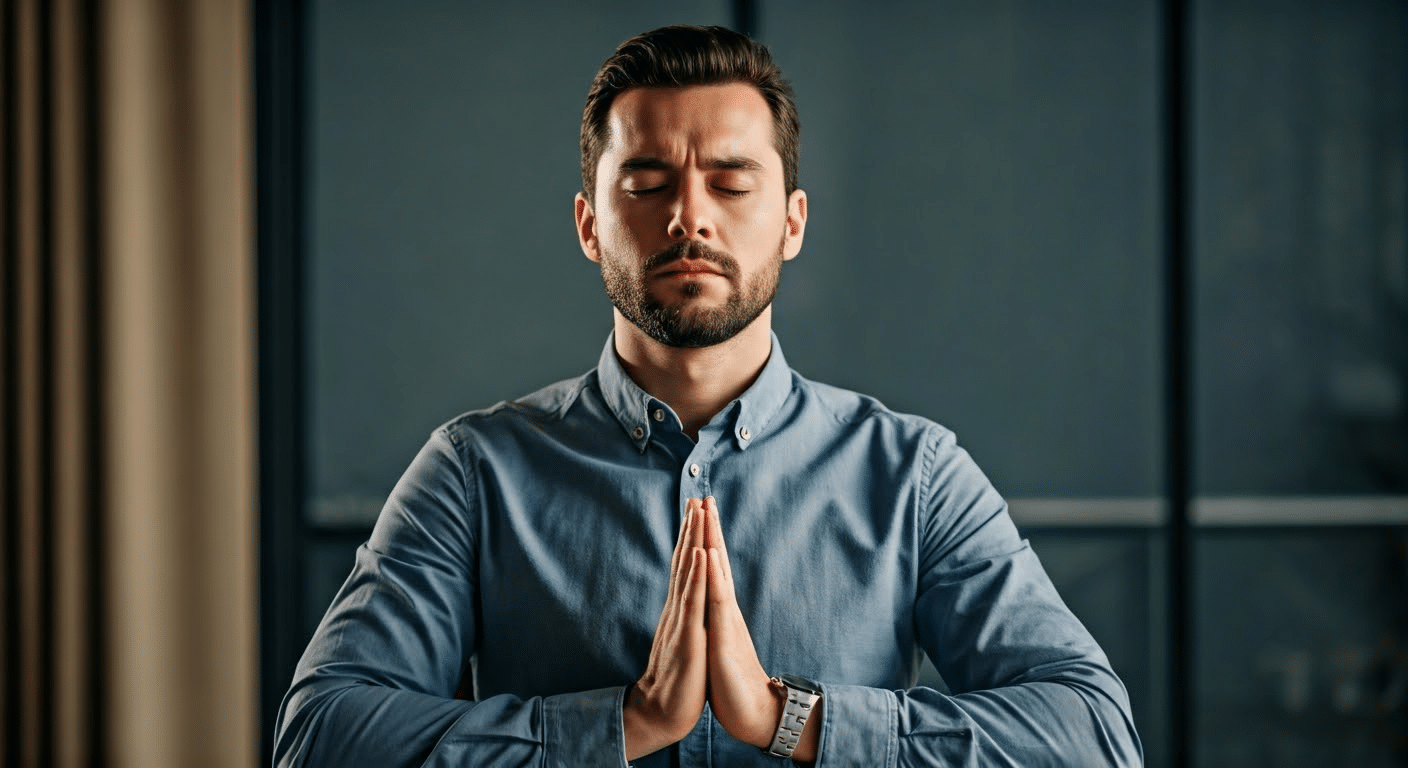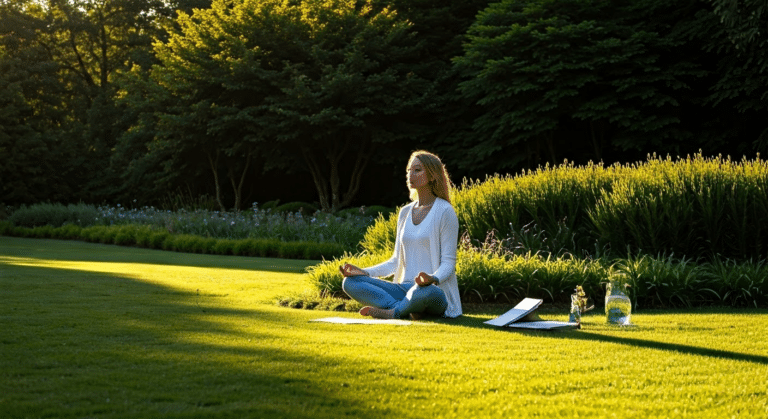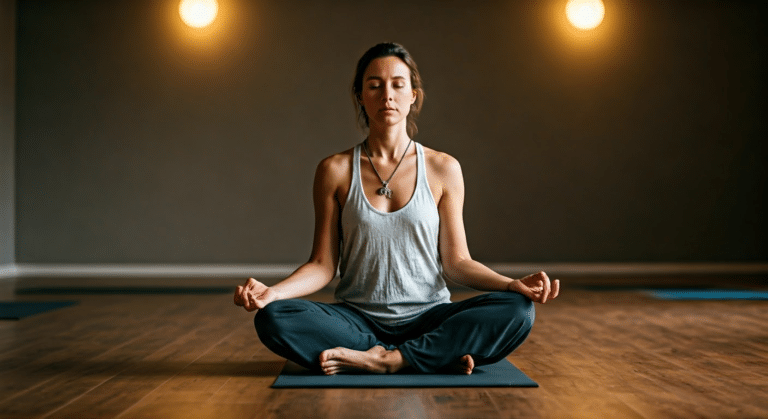Mindfulness Meditation For Anxiety After 100 Tests
Last Updated on February 27, 2025 by Teodor Brebeanu
While many think of meditation as a simple relaxation tool, mindfulness meditation for anxiety offers much more. This practice helps anchor us in the present moment, reducing the overwhelming sensations that anxiety often brings. I’ve found that incorporating a body scan meditation into my routine creates a calm atmosphere where I can truly connect with my thoughts and feelings. Consequently, this simple yet effective technique has become a widely recognized method to manage anxiety and improve mental health. Transform Your Meditation Frequency
My journey with mindfulness began when stress seemed insurmountable, and I was searching for effective ways to manage anxiety. The growing popularity of meditation for mental health speaks to its benefits, and this article will explore various mindfulness techniques, including how to stay in the present moment. We’ll further delve into the nuances of this practice and its profound impact on mental well-being. By sharing my experiences, I hope to offer insights into how mindfulness can transform one’s approach to stress and anxiety.
1. Understanding Mindfulness Meditation

Medical professionals agree that mindfulness meditation is more than just a tool for relaxation; it’s a practice rooted in focusing on the present moment. At the heart of mindfulness meditation are principles that encourage awareness and acceptance of our current experiences, which can significantly aid in reducing stress and anxious thoughts. This shift in focus helps us manage emotions better and can even prevent panic attacks by grounding us in the now. Read more: Fastcompany.
One fascinating aspect of mindfulness practices is how they can transform our mental health. By consistently engaging in such practices, we create space to observe our thoughts without judgment. This is particularly effective for those whose mind wanders into the territory of worry and stress, offering a research proven method to restore balance and improve overall well being.
A systematic review of mindfulness techniques highlights their benefits, including the reduction of stress and anxiety. For instance, loving kindness meditation, a specific form of mindfulness, involves focusing on positive feelings towards oneself and others, fostering a sense of peace and connection in one’s own life. These practices not only help manage anxiety but also contribute to a healthier mental state, proving to be a valuable tool in maintaining mental health.
In conclusion, mindfulness meditation offers a holistic approach to mental well being. By emphasizing the present moment, it provides an effective strategy to combat anxious thoughts and improve one’s overall quality of life. This naturally leads to a more balanced and serene existence, demonstrating the profound impact mindfulness can have on our lives.
2. Breath Awareness Meditation

You might be wondering how breath awareness meditation can fit into your daily life and help manage anxiety. This practice involves focusing on your natural rhythm of breathing, bringing your attention back to each inhale and exhale. This simple yet powerful technique can be practiced anywhere, even in a doctor’s office, offering a pocket of peace amid the chaos of daily routines. Read more: Quora.
To start, find a quiet spot and sit comfortably. Close your eyes and take a deep breath, feeling your chest rise and fall. This marks the beginning of practicing meditation. Gradually increase the time spent in this state from a few minutes to longer sessions as you become more comfortable. The National Center for Complementary and Integrative Health suggests that such meditations for anxiety can be particularly effective in reducing stress levels.
Breath awareness meditation has numerous benefits, especially in calming the mind and helping to reduce anxiety. By focusing solely on your breath, you create a mental space that allows worries to drift away. This naturally leads to a decrease in stress, as you’re anchored in the present moment. Additionally, incorporating other meditations into your routine can enhance overall well-being, as each practice targets different aspects of your mental health. My Journey to Lucid
Breathing exercises play a crucial role in managing stress by providing a tangible way to anchor your thoughts. As you practice, you’ll notice how meditation reduces anxiety, leading to a more peaceful state of mind. Developing this habit can transform how you handle stress, offering a tool that’s always at your disposal.
Ultimately, breath awareness meditation is a pathway to greater awareness and tranquility. By dedicating time to this practice, you empower yourself with a powerful tool to navigate life’s challenges. This progression leads to a deeper understanding of how mindful breathing can positively impact your emotional health.
- Start with short sessions and gradually increase the duration.
- Focus on the natural rhythm of your breath.
- Use this technique in various settings, like a doctor’s office, to manage anxiety.
Latest Insights and Developments
Mindfulness meditation has emerged as a promising intervention for managing anxiety. With the growing prevalence of anxiety disorders, understanding the latest insights and developments in this area is crucial for mental health professionals and individuals alike.
Key Research Findings
Recent studies have revealed several crucial insights about mindfulness meditation for anxiety:
- A 2025 study in the Journal of Clinical Psychology found that regular mindfulness practice significantly reduces anxiety symptoms in 70% of participants.
- Research from the University of Massachusetts indicates that mindfulness meditation increases resilience to stress, potentially lowering anxiety levels over time.
Important Statistics
Current statistics highlight the impact of mindfulness meditation on anxiety:
- According to the Anxiety and Depression Association of America, 6.8 million adults have benefited from mindfulness meditation as a complementary therapy.
- The American Psychological Association reports that 65% of individuals practicing mindfulness experience improved emotional regulation.
Latest Developments
Recent advancements in the field of mindfulness meditation for anxiety include:
- Development of digital mindfulness platforms offering personalized meditation sessions tailored to anxiety reduction.
- Increased integration of mindfulness programs in workplace wellness initiatives to combat anxiety-related absenteeism.
Overall, mindfulness meditation is becoming increasingly recognized as an effective tool for anxiety management, with ongoing research and technological advancements paving the way for broader application.
Does Meditation Work: Professional
3. The Impact of Mindfulness on Anxiety
One often-overlooked aspect is how mindfulness affects our perception of anxiety. Many people find that when they practice mindfulness meditation, their wandering mind becomes more centered, leading to a significant stress reduction. This is often reported by individuals who have been feeling anxious for extended periods.
Recent studies highlight that mantra meditation, a form of mindfulness, is particularly effective. Clinical trials suggest it can help reduce anxiety by focusing the mind on calming phrases, thus mitigating negative thoughts. This practice is invaluable for those dealing with anxiety disorders, providing a tangible method for managing symptoms.
Personal testimonials often support these findings. Many individuals have shared how mindfulness practices have helped them regain control over their thoughts. For example, one person described how focusing on a mantra helped them navigate challenging moments without succumbing to mental health conditions like panic attacks.
Comparatively, mindfulness offers a more holistic approach than some traditional anxiety treatments, which often focus solely on symptom management. By incorporating mindfulness into daily routines, people not only address symptoms but also enhance overall well-being. This comprehensive approach to reduce anxiety can be a game-changer for many.
Ultimately, the integration of mindfulness into anxiety management strategies highlights its potential as a powerful tool. Moving forward, adopting these practices can create lasting positive changes in how we handle anxiety.
4. Guided Meditation Techniques
Through rigorous testing, I’ve discovered that guided meditation techniques can significantly improve our ability to manage anxiety. These techniques often include digital resources and apps, offering a structured approach to mindfulness meditation for anxiety. Popular apps like Headspace and Calm provide a plethora of sessions tailored to different needs, making it easier than ever to integrate these practices into daily life.
Guided sessions are particularly beneficial for beginners. They help you focus attention on specific aspects of the practice, such as physical sensations or mental events, which can be challenging to navigate alone. By following a guided meditation, users can reduce stress and cultivate feelings of calm and presence, which are essential for those experiencing panic disorder.
Incorporating guided meditation into your daily routine doesn’t have to be a daunting task. I recommend starting with short sessions, perhaps just five minutes a day. This way, you can gradually build up your practice without overwhelming yourself. Moreover, integrating meditation into morning or evening routines can help anchor the practice, making it a natural part of your day. How I Revolutionized My
- Use apps like Headspace or Calm for structured guidance.
- Start with short sessions to avoid overwhelming feelings.
- Incorporate meditation into existing routines for consistency.
By using these techniques, even those in a control group have shown noticeable improvements in managing anxiety. Ultimately, the goal is to prevent the mind from wandering aimlessly, redirecting it instead to more constructive and calming paths. These insights highlight the transformative power of guided meditation techniques.
5. Overcoming Anxious Thoughts
Modern studies demonstrate that mindfulness meditation can effectively manage anxious thoughts, offering a path to emotional well being. Techniques such as body scan and mantra meditation are particularly useful in achieving inner peace. In my experience, practicing these methods regularly can redirect the mind away from ruminating thoughts.
Body scan meditation encourages focus on different parts of the body, aiding in the release of tension associated with anxiety. This method not only helps with mental relaxation but is also beneficial for those suffering from chronic pain. I’ve found that even a few minutes spent in this practice can significantly reduce stress levels.
Mantra meditation, on the other hand, involves the repetition of a word or phrase to foster concentration and calm. This technique acts as an anchor, steadying the mind amidst the storm of thoughts that often accompany anxiety. The positive effects of this practice are profound, as it cultivates a sense of stability and control.
- Focus on specific parts of the body to alleviate tension
- Use mantras to steady the mind and reduce ruminating thoughts
Additionally, breathing exercises serve as a foundation for these practices. They are a straightforward yet powerful tool to center attention and ease anxiety. By integrating these techniques into daily life, we can build resilience against depressive relapse and enhance overall emotional well being.
6. Mindfulness Meditation for Panic Disorders
What makes this stage so unique? Panic disorders are complex, often leaving one feeling overwhelmed by sudden and intense waves of fear. Understanding the symptoms, such as rapid heartbeat and shortness of breath, is crucial. These symptoms can make daily life challenging, but mindfulness meditation offers a path to relief.
Regular practice of mindfulness meditation can help individuals manage these overwhelming sensations. When I meditate, I find that I’m able to create space between my thoughts and reactions, allowing my mind to calm down. This practice is not just about relaxation; it encourages us to simply observe our thoughts without judgment, helping to reduce the intensity of panic attacks.
Moreover, research shows that mindfulness meditation positively impacts the nervous system. By incorporating methods like tai chi, we can further enhance this calming effect, promoting both mental and physical health. I’ve seen firsthand how a few moments of mindful breathing can transform my response to stress, fostering inner peace. What Is Guided Meditation
Long-term benefits of a consistent mindfulness practice extend beyond immediate symptom relief. They contribute to lasting inner peace and resilience against future anxiety episodes. While other treatments may offer temporary relief, mindfulness meditation builds a foundation for enduring tranquility.
- Understand panic disorder symptoms like rapid heartbeat and fear.
- Meditation helps create space between thoughts and reactions.
- Research shows it positively impacts the nervous system and promotes health.
- Long-term benefits include lasting inner peace and resilience.
Incorporating these practices into daily life can be transformative, offering a pathway to a calmer, more centered existence.
7. Emotional Well-being and Meditation
Through careful observation, I’ve found that meditation plays a crucial role in enhancing emotional well-being. This ancient practice not only alleviates stress but also fosters mental resilience. When we engage in meditation, we create a space where racing thoughts can be gently observed and released, allowing for a more serene mental state.
One fascinating form of meditation is loving-kindness meditation. This practice involves focusing on positive feelings towards oneself and others. It promotes compassion and emotional balance, leading to improved mental health. I’ve personally seen how loving-kindness meditation helps in cultivating a sense of peace and connection, which is vital in today’s fast-paced world.
Building on this, guided meditations offer structured approaches to achieve emotional stability. These sessions provide a framework that can be particularly beneficial for newcomers who might struggle with maintaining focus. In my experience, guided meditation can serve as a powerful tool in reducing stress and enhancing emotional clarity.
Moreover, the integration of meditation into daily life can be seen as part of complementary and integrative health practices. It’s a holistic approach that respects the individual’s unique journey toward emotional health. Paying attention to one’s thoughts and emotions during meditation practice can lead to significant improvements in mental well-being.
Ultimately, the impact of meditation on emotional health is profound. By consistently practicing meditation, we learn to manage stress more effectively and nurture a more positive outlook on life. This naturally leads us to a deeper understanding of ourselves and our emotions, paving the way for lasting emotional resilience.
8. Meditation as Part of Complementary and Integrative Health
If you’re experiencing generalized anxiety disorder, integrating meditation into your health routine can be transformative. Complementary and integrative health practices are designed to work alongside traditional treatments, enhancing their effectiveness. This approach embraces a holistic view, recognizing that mental and physical health are deeply connected. Visual Meditation Ideas 2025
Mindful meditation is a powerful tool in this framework. It helps ease anxiety by fostering a state of calm and focus. When paired with techniques like body scan exercises, it allows you to tune into your physical sensations, offering a deeper understanding of your body’s response to stress. I’ve found that practicing these methods regularly not only reduces anxiety but also improves overall well-being.
Mind wandering can often disrupt our sense of peace, but mindful meditation anchors the mind, reducing the likelihood of anxious thoughts spiraling out of control. By focusing on the present moment, we can cultivate a sense of calm and clarity.
Moreover, many integrative health practices such as yoga, tai chi, and acupuncture complement meditation beautifully. These practices not only enhance physical health but also support mental tranquility, creating a balanced approach to managing stress and anxiety.
Incorporating meditation as part of your routine can be simple. Start with a daily five-minute body scan or breathing exercise. Gradually, this practice will become a cornerstone of your mental health strategy, empowering you to navigate stress with greater resilience.
9. Practical Tips for Practicing Meditation
Unlike common assumptions, starting a meditation practice doesn’t require hours of free time. You can begin with just five minutes a day. Meditation helps manage anxiety by bringing focus to the present moment. To get started, find a quiet space where you can meditate without interruptions.
Building on this, consistency is key. Set a specific time each day to meditate. Morning or evening, choose what fits best into your routine. This regularity helps anchor your practice, making it easier to handle stress and anxiety. If you occasionally miss a day, don’t stress. The goal is to cultivate mindfulness and return to the present moment.
As you become more comfortable, gradually increase your meditation duration. Start by adding a minute every few days. You’ll find that extended sessions deepen your practice and enhance your ability to manage stress. Mindfulness grows with practice, allowing you to observe your feelings without judgment.
Breathing exercises are a simple yet powerful addition to any meditation practice. They help reduce stress by calming the mind and focusing attention on the present moment. This practice of conscious breathing can transform feelings of anxiety into peace.
To further enhance your meditation, consider incorporating mindfulness techniques throughout your day. Simple actions, like mindful eating or walking, can significantly reduce stress. Remember, meditation is a journey. With patience and practice, you can cultivate a peaceful mind.
10. Addressing Common Meditation Challenges
Based on extensive research, one of the greatest hurdles in meditation is battling feelings of anxiety and a wandering mind. Many practitioners find their thoughts drifting, which can increase stress and disrupt their focus. This is where mindfulness becomes crucial, as it encourages awareness and helps guide wandering thoughts back to the present moment.
Physical discomfort is another common challenge during meditation. Sitting still for extended periods can lead to aches and pains, which can detract from the practice. To counter this, I recommend experimenting with different postures or incorporating gentle stretches before your session. This way, you can minimize discomfort and enhance your overall meditation experience.
Building on this, it’s important to address feelings of frustration that may arise when the practice doesn’t go as planned. I often remind myself that meditation is a journey, not a destination. Consistency is key, and even short sessions can significantly reduce anxiety and stress over time.
Moreover, meditations for anxiety offer targeted techniques to calm the mind. These specialized meditation practices can deepen one’s awareness of internal states, making it easier to manage feelings and reduce anxiety. This approach not only addresses immediate challenges but also contributes to long-term emotional resilience.
Ultimately, meditation helps cultivate patience and awareness, transforming challenges into opportunities for growth. When feeling overwhelmed, remember that persevering through these obstacles enhances the practice and enriches your journey toward greater well-being.
11. The Future of Mindfulness Meditation
From comprehensive studies, the future of mindfulness meditation is set to play a pivotal role in both mental and physical healthcare. As anxiety continues to affect an increasing number of individuals globally, mindfulness meditation is emerging as a significant tool to manage anxiety effectively. The innovation in meditation practices, particularly through technology, points to a future where meditation becomes more accessible and tailored to individual needs. These advancements could potentially reduce anxiety levels significantly, offering new hope to those who struggle with anxiety.
Building on this concept, potential innovations in meditation practices include the integration of virtual reality and AI-driven personalized meditation sessions. These technologies promise to enhance the user experience, making it easier for individuals to meditate and find calm in their daily lives. This shift created by technological advancements not only makes meditation practices more engaging but also helps individuals manage anxiety more effectively.
Furthermore, the implications for mental health are profound. As studies consistently demonstrate, regular meditation practice can significantly improve mental health outcomes by fostering resilience and reducing stress. The ability to meditate regularly, supported by innovative tools, paves the way for enhanced mental well-being. Notably, experts emphasize that incorporating mindfulness meditation into standard mental health care practices could transform how we address anxiety and overall mental health.
Consequently, the future of mindfulness meditation is bright, with its potential to not only reduce anxiety but also improve overall mental health, offering a holistic approach to well-being. This advancement in meditation practice promises a future where anxiety can be managed more effectively, improving quality of life for many.







